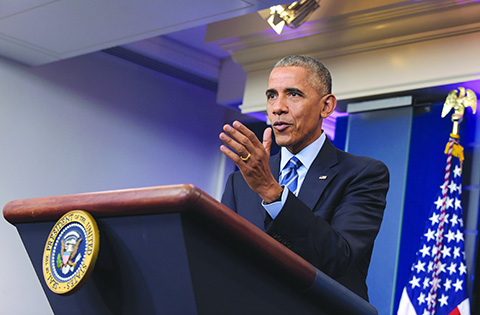NEW YORK: Economic fears are roiling Wall Street, as worries grow that the Federal Reserve may have left interest rates elevated for too long, allowing them to hurt US growth. Alarming economic data in recent days have deepened those concerns. US job growth slowed more than expected in July, a Friday report showed, while the unemployment rate increased to 4.3 percent, heightening fears that a deteriorating labor market could make the economy vulnerable to a recession.
The jobs report exacerbated a selloff in stocks that began on Thursday, when data showing weakness in the labor market and manufacturing sector pushed investors to dump everything from chip stocks to industrials while piling into defensive plays.
Richly valued tech stocks tumbled further on Friday, extending losses in the Nasdaq Composite to more than 10 percent from a record closing high reached in July. The benchmark S&P 500 index has slid 5.7 percent from its July peak. “This is what a growth scare looks like,” said Wasif Latif, president and chief investment officer at Sarmaya Partners. “The market is now realizing that the economy is indeed slowing.”
For months, investors had been heartened by cooling inflation and gradually slowing employment, believing they bolstered the case for the Fed to begin cutting interest rates. That optimism drove big gains in stocks: the S&P 500 remains up 12 percent this year, despite recent losses; the Nasdaq has gained nearly 12 percent. Now that a September rate cut has come into view following a Fed meeting this week, investors are fretting that elevated borrowing costs may already be hurting economic growth. Corporate earnings results, which saw disappointments from companies such as Amazon, Alphabet and Intel, are adding to their concerns.
“We’re witnessing the fallout from the curse of high expectations,” said James St Aubin, chief investment officer at Ocean Park Asset Management. “So much had been invested around the scenario of a soft landing, that anything that even suggests something different is difficult.” Next week brings earnings from industrial bellwether Caterpillar and media and entertainment giant Walt Disney, which will give more insight into the health of the consumer and manufacturing, as well as reports from healthcare heavyweights such as weight-loss drugmaker Eli Lilly.
Bets in the futures markets on Friday suggested growing unease about the economy. Fed fund futures reflected traders pricing an over-70 percent chance of a 50-basis point cut at the central bank’s September meeting, compared to 22 percent the day before, according to CME FedWatch. Futures priced a total of 116 basis points in rate cuts in 2024, compared to just over 60 basis points priced in on Wednesday. Broader markets also showed signs of unease. The Cboe Volatility index known as Wall Street’s fear gauge - hit its highest since March 2023 on Friday as demand for options protection against a stock market selloff rose.
Meanwhile, investors have rushed into safe haven bonds and other defensive areas of the market. US 10-year yields - which move inversely to bond prices - on Friday dropped as low as 3.79 percent, the lowest since December. Sectors that are often popular during times of economic uncertainty are also drawing investors.
Options data for the Health Care Select Sector SPDR Fund showed the average daily balance between put and call contracts over the last month at its most bullish in about three years, according to a Reuters analysis of Trade Alert data. Trading in the options on Utilities Select Sector SPDR Fund also shows a pullback in defensive positioning, highlighting traders’ expectations for strength for the sector.
The healthcare sector is up 4 percent in the past month, while utilities are up over 9 percent. By contrast, the Philadelphia SE Semiconductor index is down nearly 17 percent in that period amid sharp losses in investor favorites such as Nvidia and Broadcom. To be sure, some investors said the data could just be a reason to lock in profits after the market’s overall strong run in 2024.
“This is a good excuse for investors to sell after a huge year to date rally,” said Michael Purves, CEO of Tallbacken Capital Advisors. “Investors should be prepared for some major volatility, particularly in the big tech stocks. But it will probably be short-lived.” — Reuters










